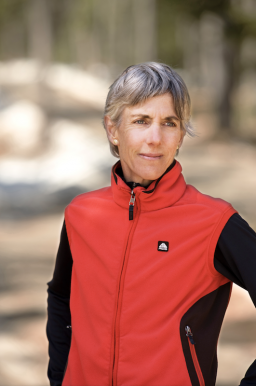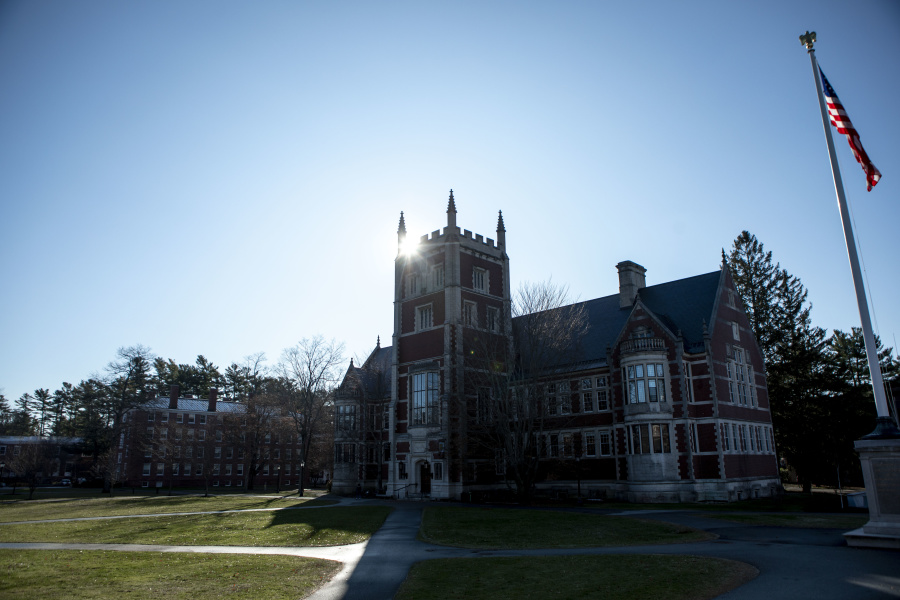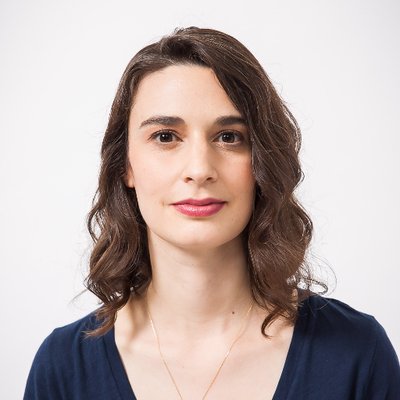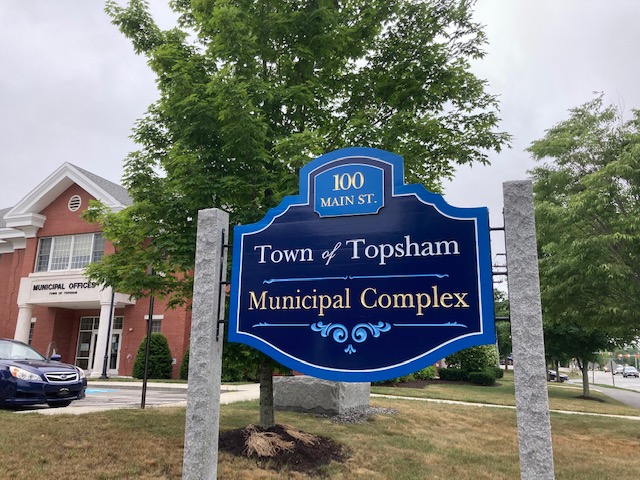Published November 13, 2015 by Rebecca Goldfine
Matt Klick ’98 Finds Novel Approach to Helping the Impoverished
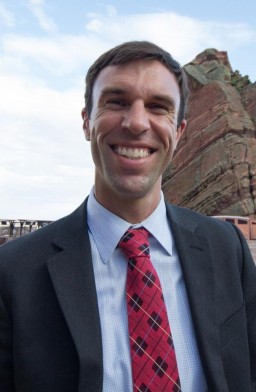
Matthew Klick ’98 majored in Latin American studies at Bowdoin before earning a master’s degree in Resource and Applied Economics from the University of Alaska-Fairbanks, and a Ph.D. in Comparative Politics and International Political Economy from the University of Denver.
Klick, who is a post-doctoral fellow at University of Denver’s Joseph Korbel School of International Studies, recently visited Bowdoin to give a talk to students interested in development or Latin American studies. He was invited by the Latin American Studies program. Allen Wells, Bowdoin’s Roger Howell, Jr. Professor of History, introduced him, saying Klick had traveled the road less traveled to his current job. Before he became a political scientist, Klick was a boatbuilder, and worked in boat shops in Maine, Norway and Italy. He also lobstered during some summers while he was a student at Bowdoin.
Speaking in a crowded room in Kanbar Hall, Klick described his research of the past two years. He focused on two Guatemalan communities that represented opposite extremes of development — Santa Lucía La Reforma and Santa María Chiquimula. Before he identified which municipality was scoring higher on development metrics, such as literacy rates, infant mortality and chronic hunger, Klick noted that 98 percent of the population in Santa Lucía La Reforma live in poverty or extreme poverty. In Santa María Chiquimula, that rate is around 80 percent.
Because it is extremely poor, La Reforma seems as if it should have lower literacy rates and higher hunger and infant mortality numbers than its slightly better off neighbor, Klick pointed out. Yet, despite its severe poverty, La Reforma “was by far the best performing community of any of the six in treating chronic hunger over 11 years [from 2005-2011], treating infant mortality and treating literacy,” Klick said. “Meanwhile, Chiquimula was my worst performer. Its human development index scores have been static over the last decade,” ranking it among the worst performing areas in the world.
Klick strove to uncover the reason why two communities only 24 kilometers apart were so different. He looked at a number of possible causes, such as remoteness, state involvement and crime rates, but found none of them was making an impact on the communities.
After months of conducting one-on-one interviews and focus groups, Klick said he “began to see shapes emerging through the fog,” likening this experience to his lobstering days when buoys would slowly become visible through sea mists as he approached in his boat.
After months of conducting one-on-one interviews and focus groups, Klick said he “began to see shapes emerging through the fog,” likening this experience to his lobstering days when buoys would slowly become visible through sea mists as he approached in his boat.
Matthew Klick ’98 is launching an NGO, the Arctic and Mountain Regions Development Institute, to test out in the field some of his ideas, such as “complementarity,” or the practice of state agents collaborating with local leaders on development goals. “[Complementarity] requires levels of empathy, context sensitivity and more anthropologists than economists,” Klick said. “It’s a brokerage between those who have resources and those who need them.”
What Klick found is that the difference driving the progress in La Reforma and the back sliding in Chiquimula came down to how involved informal local leaders were in community development projects. In poor performing Chiquimula, religious schisms between Catholics and Evangelicals had hardened into political divisions, deeply fracturing the community. So when resources were made available to help the poor — such as medical care or food — this aid often ended up with the allies of those in power rather than with those most in need.
While La Reforma’s population also has its devout Protestants and faithful Catholics, these differences were not preventing resources from being shared more equitably. Klick also observed that in this community, state workers and aid groups were collaborating with indigenous leaders. “They [the informal local leaders] have no legal standing,” Klick said, “but they have a lot of legitimacy based on their role as elders in the Mayan religion.” In addition, respected locals were trying to bridge the gap between religious groups around development issues. In contrast, the power of traditional leaders in Chiquimula had been weakened, likely by powerful players in local political parties.
“It’s unclear why local governance was so much better in la Reforma, but a lot of things had to come together — state actors who were deferential and well-intentioned, the absence of a political party rivalry, and the continued relevance of traditional leaders from the villages,” Klick said.
“As for Chiquimula, it’s one of the toughest nuts to crack, because it’s so divisive. But there are still opportunities — to take a more conflict resolution approach to development, and find the neutral arbiter with legitimacy, like the indigenous leaders, in fact, by giving them a new role.”
Klick calls the cooperation of local, state and international actors “complementarity” — when outsiders honor, and utilize, local norms, customs and political arrangements. He said this approach counters the conventional method of development that’s been practiced in such distressed places as Afghanistan and the Democratic Republic of the Congo. Traditionally, global development organizations, e.g. the World Bank and the International Monetary Fund, have focused on state building, and “parachuting in strong institutions,” such as our Western notions of a strong constitution, accountable judicial system, impartial police force, free market system and liberal democracy, Klick said. But this has been “expensive, conflict inducing and it hasn’t helped development in these places,” he argued.
Throughout the world, marginalized groups of people with strong ethnolinguistic, religious or tribal identities sometimes also can harbor suspicions about the state government, interpreting its actions, even when well meaning, as attempts to snuff out and exclude their culture, autonomy and role of traditional leaders, Klick added.
“We can’t engineer from the outside,” he said. “Instead of treating development like a technocratic practice or a fix we can engineer…development should be an art, more akin to diplomacy.”
While La Reforma’s population also has its devout Protestants and faithful Catholics, these differences were not preventing resources from being shared more equitably. Klick also observed that in this community, state workers and aid groups were collaborating with indigenous leaders. “They [the informal local leaders] have no legal standing,” Klick said, “but they have a lot of legitimacy based on their role as elders in the Mayan religion.” In addition, respected locals were trying to bridge the gap between religious groups around development issues. In contrast, the power of traditional leaders in Chiquimula had been weakened, likely by powerful players in local political parties.
“It’s unclear why local governance was so much better in la Reforma, but a lot of things had to come together — state actors who were deferential and well-intentioned, the absence of a political party rivalry, and the continued relevance of traditional leaders from the villages,” Klick said.
“As for Chiquimula, it’s one of the toughest nuts to crack, because it’s so divisive. But there are still opportunities — to take a more conflict resolution approach to development, and find the neutral arbiter with legitimacy, like the indigenous leaders, in fact, by giving them a new role.”
Klick calls the cooperation of local, state and international actors “complementarity” — when outsiders honor, and utilize, local norms, customs and political arrangements. He said this approach counters the conventional method of development that’s been practiced in such distressed places as Afghanistan and the Democratic Republic of the Congo. Traditionally, global development organizations, e.g. the World Bank and the International Monetary Fund, have focused on state building, and “parachuting in strong institutions,” such as our Western notions of a strong constitution, accountable judicial system, impartial police force, free market system and liberal democracy, Klick said. But this has been “expensive, conflict inducing and it hasn’t helped development in these places,” he argued.
Throughout the world, marginalized groups of people with strong ethnolinguistic, religious or tribal identities sometimes also can harbor suspicions about the state government, interpreting its actions, even when well meaning, as attempts to snuff out and exclude their culture, autonomy and role of traditional leaders, Klick added.
“We can’t engineer from the outside,” he said. “Instead of treating development like a technocratic practice or a fix we can engineer…development should be an art, more akin to diplomacy.”
